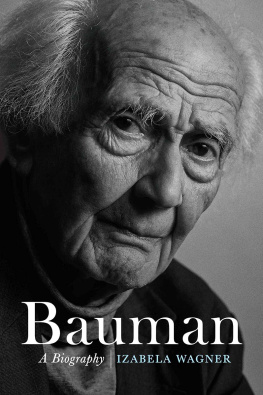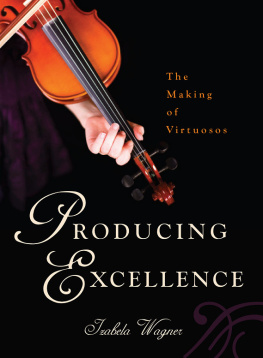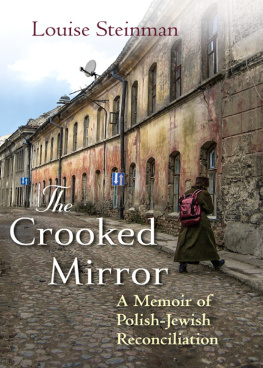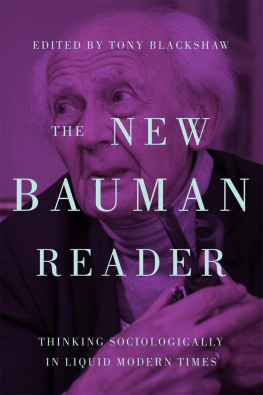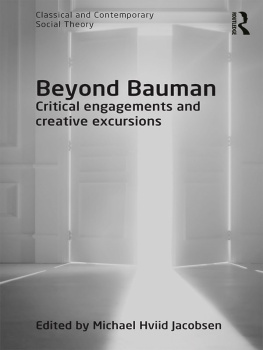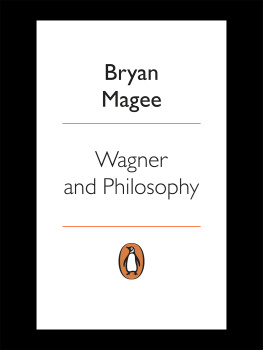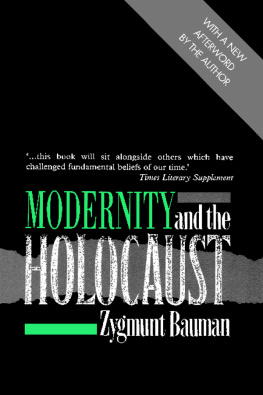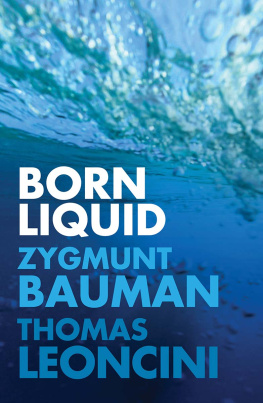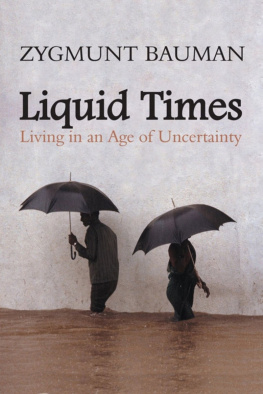
Bauman
A Biography
Izabela Wagner
polity
Copyright Izabela Wagner 2020
The right of Izabela Wagner to be identified as Author of this Work has been asserted in accordance with the UK Copyright, Designs and Patents Act 1988.
First published in 2020 by Polity Press
Polity Press
65 Bridge Street
Cambridge CB2 1UR, UK
Polity Press
101 Station Landing
Suite 300
Medford, MA 02155, USA
All rights reserved. Except for the quotation of short passages for the purpose of criticism and review, no part of this publication may be reproduced, stored in a retrieval system or transmitted, in any form or by any means, electronic, mechanical, photocopying, recording or otherwise, without the prior permission of the publisher.
ISBN-13: 978-1-5095-2689-5
A catalogue record for this book is available from the British Library.
Library of Congress Cataloging-in-Publication Data
Names: Wagner, Izabela, author.
Title: Bauman : a biography / Izabela Wagner.
Description: Cambridge, UK ; Medford, MA, USA : Polity Press, 2020. | Includes bibliographical references and index. | Summary: A comprehensive account of the life and work of one of the most influential social thinkers of our time-- Provided by publisher.
Identifiers: LCCN 2019051800 (print) | LCCN 2019051801 (ebook) | ISBN 9781509526864 (hardback) | ISBN 9781509526895 (epub)
Subjects: LCSH: Bauman, Zygmunt, 1925-2017 | Sociology.
Classification: LCC HM479.B39 W34 2020 (print) | LCC HM479.B39 (ebook) | DDC 301--dc23
LC record available at https://lccn.loc.gov/2019051800
LC ebook record available at https://lccn.loc.gov/2019051801
The publisher has used its best endeavours to ensure that the URLs for external websites referred to in this book are correct and active at the time of going to press. However, the publisher has no responsibility for the websites and can make no guarantee that a site will remain live or that the content is or will remain appropriate.
Every effort has been made to trace all copyright holders, but if any have been overlooked the publisher will be pleased to include any necessary credits in any subsequent reprint or edition.
For further information on Polity, visit our website: politybooks.com
People in a state of exaltation crave not knowledge but legends; not the comparative distance of history, but the affirmation of their raison dtre, their beliefs by tradition. They want unambiguous explanations and uniting symbols.
(Jerzy Jedlicki, 1993: 163)
In memory of Keith Tester
Acknowledgements
Contrary to popular belief, even single-author book projects arent the product of a solitary worker (Becker, 1982), and many people formed links in the long chain of collaboration that led to this finished book.
I am deeply grateful to Arthur Allen, my friend of eight years and my closest collaborator, without whom I would not have been able to give English-speakers the pleasure of reading this book. Arthur is a successful writer, and author of Vaccine: The Controversial Story of Medicines Greatest Lifesaver. As a writer and editor in the health and science section at Politico in Washington, DC, he is a very busy journalist, but found time for Baumans biography because he is also an enthusiastic historian. Since the beginning of our friendship, we have helped complete each others expertise, skills and knowledge. When we met in 2011, Arthur was working on his book The Fantastic Laboratory of Dr. Weigl (2014), and I became his research assistant for Polish documents and his consultant on parts of Polish history. Thanks to my contribution to Arthurs project, I learned a lot about World War II, postwar documents, the Institute of Remembrance (IPN) and other archives in Poland. This knowledge was critical to much of the documentation of the present book.
I am not an English native speaker, having taught myself the language after a formal PolishFrench education. Arthur not only corrected my mistakes, detected false French cognates and polished my English, but also challenged my purposes and pushed me to be more accurate, sceptical and clear. He perfectly understood my jokes, personal style and emotional way of writing, which was crucial for maintaining my specific form of expression the biggest challenge in cultural translation. Through his corrections, Arthur obtained an expression of what I wanted to say, but did not know yet know how to say!
His contribution was not only editorial but also historical. Arthurs remarks, questions, advice and formal suggestions (such as separating chapters or reformulating titles) helped me shape my narration in clearer, yet scientifically pertinent, ways. I am deeply grateful for the hours, days and months Arthur devoted to correcting this manuscript (he also edited my previous book, Producing Excellence, Rutgers University Press, 2015), and for his enthusiastic feedback and tips. We worked on these three books together while exchanging only mutual trust and fascination in our work; if the latter is not rare, the former is exceptional. Our friendship and collaboration made the writing a less lonely and more pleasant activity.
I am grateful to the many people who trusted me and spent time recalling their experiences of Bauman as a teacher, colleague, friend or relation. This long list starts with Aleksandra Jasiska-Kania, who made possible my two interviews with Zygmunt Bauman; she prepared our meetings, which were extremely rich in new data. I am also grateful for our interviews and discussions that took place after Zygmunt Bauman passed away. Aleksandra Jasiska-Kania also introduced me to Baumans daughters.
I am deeply grateful to Anna Sfard, Lydia Bauman and Irena Bauman for their trust, the enormous boost they gave my research, and the fascinating conversations we shared. They not only accorded me their time and responded to all the questions I asked, but also gave me free access to two unpublished manuscripts by their father. These unique texts (which I obtained in December 2017) confirmed my previous hypothesis and filled out the picture I drew from my interviews with Bauman. I wish also to thank the Bauman family for the rights to publish family pictures. I am particularly grateful to Lydia Bauman for her trust, and access to her private journal that described the familys travel to Israel in 1968. She also agreed to the use of the portrait of her father that she painted.
I am immensely grateful to the thirty-nine other people living in different parts of the world whom I interviewed for the book. In Warsaw (in chronological order of our interviews), I met Karol Modzelewski, Barbara and Jerzy Szacki, Andrzej Werblan, Jzef Hen, Aleksandra Jasiska-Kania, Micha Komar, Stanisaw Obirek, Marian Turski, Adam Michnik, Jerzy Wiatr, Tomasz Kitliski and his parents, and Adam Ostolski; in Pozna, Roman Kubicki and Tomasz Kowalski; in Geneva, Bronisaw Baczko; in New York, Irena Grudziska-Gross, Krystyna Fischer and Jan T. Gross; in Israel, Emmanuel Marx, Shalva Weil and Uri Ram; in the UK, Griselda Pollock, Tony Bryant, Janet Wolff, Keith Tester, John Thompson, Alan Warde and Monika Kostera. This last interview was conducted by Skype. I would also like to thank three individuals who did not want their names to be mentioned. I also spoke on the phone and/or exchanged letters with Adam Chmielewski, Leszek Kwiatkowski, Joanna Tokarska-Bakir, Wodek Goldkorn, Aleksander Perski, Elbieta Kossewska, Barbara Toruczyk and Peter Beilharz.
I wish to thank particularly Wodzimierz Holsztyski, for our correspondence and his lengthy and detailed account of the opposition activity at the University of Warsaw in the lead-up to March 1968. I am also deeply grateful to him for the permission to cite his poems. Holsztyskis talent completed my narrative in moments when academic language was inadequate in comparison to poetic aesthetics. I would like to thank Barbara Netrepko-Herbert for her translations of Holsztyskis pieces, as well as for the translation of Janina Baumans poems. I am thankful to ukasz Gos for his translation of the Antoni Sonimski poem.
Next page
